|
|
|
Sort Order |
|
|
|
Items / Page
|
|
|
|
|
|
|
| Srl | Item |
| 1 |
ID:
119087
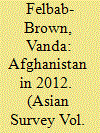

|
|
|
|
|
| Publication |
2013.
|
| Summary/Abstract |
As the 2014 transition of the U.S. out of Afghanistan approaches, progress has been made in weakening the Taliban insurgency and strengthening Afghan forces' capacity. But the Taliban still remains entrenched, negotiations have not taken off, the Afghan government suffers from a profound legitimacy crisis, and Afghanistan's economic future seems fraught with instability.
|
|
|
|
|
|
|
|
|
|
|
|
|
|
|
|
| 2 |
ID:
120493
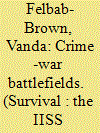

|
|
|
|
|
| Publication |
2013.
|
| Summary/Abstract |
Military conflict increasingly involves political violence, organised crime and illicit economies, while law enforcement often resembles warfare.
|
|
|
|
|
|
|
|
|
|
|
|
|
|
|
|
| 3 |
ID:
126227
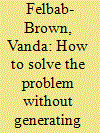

|
|
|
| 4 |
ID:
144342
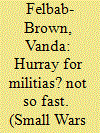

|
|
|
|
|
| Summary/Abstract |
Drawing on my fieldwork on militias in Afghanistan over the past decade, this article explores their security and political effects, with special focus on the Afghan Local Police. It analyzes changes in local security environments, effects on the Taliban insurgency and support for government, and the sustainability of and control over the militias. Key lessons include: Militias have a strong tendency to engage in abusive behavior – itself a new driver of conflict. Militias are least likely to abuse communities when they emerge spontaneously, face an abusive external force, and if major rifts and conflicts are absent from the community. Although militias might be local, their effects are not.
|
|
|
|
|
|
|
|
|
|
|
|
|
|
|
|
| 5 |
ID:
155234
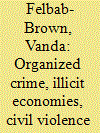

|
|
|
|
|
| Summary/Abstract |
This essay analyzes the multiple threats that organized crime and illicit economies pose to states and the international order, with a particular focus on the security dimensions of the crime-conflict nexus. In analyzing the range of responses by states and the international community to the nexus of criminal economies and civil wars, insurgencies, and terrorism, this essay also highlights how premature and ill-conceived government efforts to combat illicit economies have counterproductive effects, hampering efforts to suppress militancy and, in some cases, generating dangerous international spillovers of criminality. The second part of the essay examines various pathways out of the conflict-crime nexus, including defeating militants without suppressing illicit economies, suppressing crime and illicit economies without ending conflict, and state co-optation of illicit economies. The essay concludes with policy recommendations.
|
|
|
|
|
|
|
|
|
|
|
|
|
|
|
|
| 6 |
ID:
086197
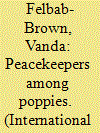

|
|
|
|
|
| Publication |
2009.
|
| Summary/Abstract |
This article analyses the role that the illicit narcotics economy has played in violent conflict in Afghanistan since the 1990s and the relationship between counter-narcotics and counter-insurgency policy in the country today. It details the evolution of the peacekeeping mission vis- -vis the narcotics economy, and the effects to date of the counter-narcotics policies that have been adopted since 2001. It argues that aggressive opium poppy eradication in Afghanistan today is premature and counterproductive with respect to counter-insurgency and stability objectives, as well as with respect to long-term economic development goals. The article concludes by providing policy recommendations on the role of peacekeeping forces with respect to illicit economies, arguing that the most important role peacekeeping forces have in tackling crime and reducing illicit economies is to provide security.
|
|
|
|
|
|
|
|
|
|
|
|
|
|
|
|
| 7 |
ID:
116343
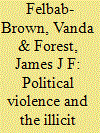

|
|
|
|
|
| Publication |
2012.
|
| Summary/Abstract |
This comparative analysis draws on field research in several West African countries to illustrate the dynamic relationships between political violence and organized crime in this sub-region. These relationships are often transactional, and almost always on a temporary basis. While some alliances of convenience may be forged, in other cases an adversarial relationship exists between organized crime and terrorist networks. In some cases, key actors within West African governments have benefited from these relationships. We then examine recent policies and strategies pursued by the U.S. and the international community that, in the name of combating terrorism, seek to constrain the illicit economies of the region, but in doing so may do more harm than good. The article concludes with some policy recommendations based on this analysis.
|
|
|
|
|
|
|
|
|
|
|
|
|
|
|
|
|
|
|
|
|